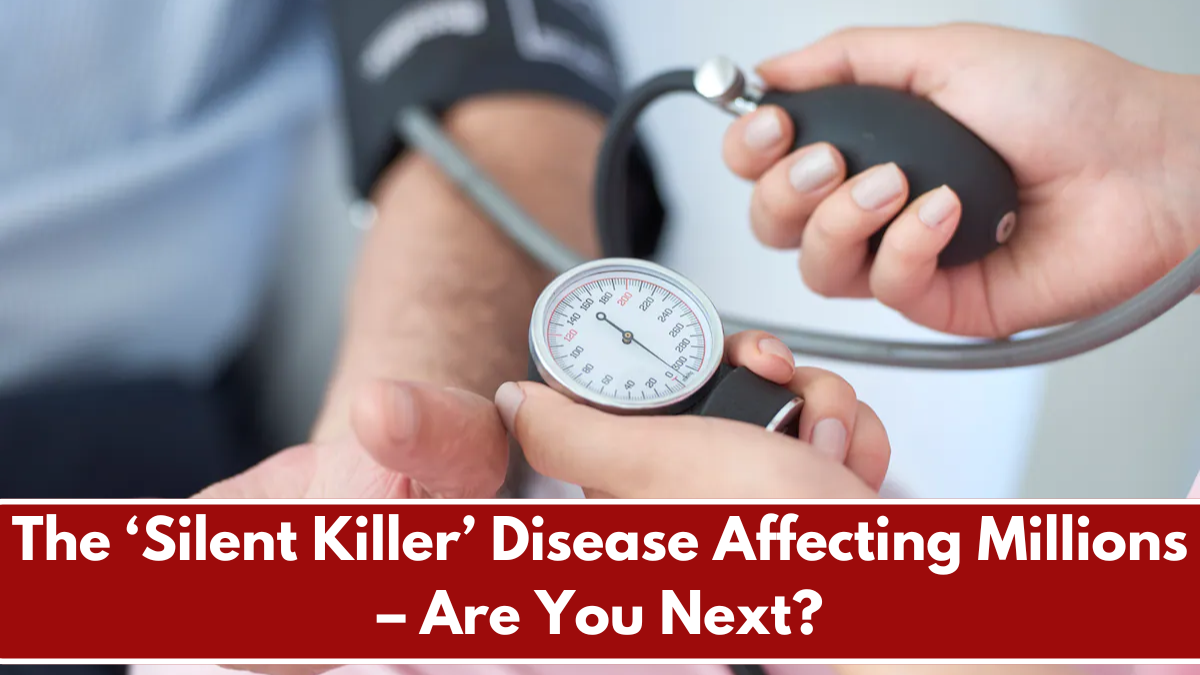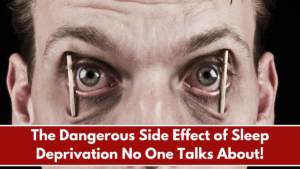There’s a dangerous disease affecting millions of people worldwide, yet most don’t even realize they have it. Known as the “silent killer,” this condition develops slowly over time, often without noticeable symptoms until it reaches a life-threatening stage. It can damage vital organs, increase the risk of heart attacks and strokes, and even lead to premature death. Despite its widespread impact, many people ignore the warning signs or fail to take preventive measures.
In this article, we will explore what this silent killer is, how it develops, who is at risk, and what steps you can take to protect yourself. By understanding the hidden dangers, you can take control of your health before it’s too late.
What Is the ‘Silent Killer’ Disease?
The term “silent killer” is commonly used to describe high blood pressure (hypertension) because it often has no noticeable symptoms until serious complications arise. Hypertension occurs when the force of blood pushing against the walls of the arteries is too high, causing strain on the heart and blood vessels over time.
Unlike other conditions that cause immediate discomfort or pain, hypertension can go unnoticed for years. Many people only discover they have high blood pressure after experiencing a major health crisis, such as a stroke, heart attack, or kidney failure. This is why regular screenings and early detection are crucial for preventing long-term damage.
How Does Hypertension Develop?
Hypertension doesn’t happen overnight—it develops gradually due to a combination of genetic, lifestyle, and environmental factors. Some of the primary causes include:
Poor Diet – Eating too much salt, processed foods, and unhealthy fats can lead to high blood pressure.
Lack of Physical Activity – A sedentary lifestyle weakens the heart, making it harder to pump blood efficiently.
Obesity – Excess weight puts additional strain on the heart and increases blood pressure.
Stress – Chronic stress leads to hormonal imbalances that can raise blood pressure over time.
Smoking and Alcohol Consumption – Both habits damage blood vessels and contribute to hypertension.
Genetics – If high blood pressure runs in your family, you are at a greater risk of developing it.
Age – Blood pressure tends to rise as people age due to natural changes in the body.
Understanding these risk factors can help you make lifestyle changes to reduce your chances of developing hypertension.
The Hidden Dangers of High Blood Pressure
Since hypertension is often symptomless, many people underestimate its impact. However, if left untreated, it can cause severe and sometimes irreversible damage to the body.
Heart Disease and Stroke
High blood pressure forces the heart to work harder, increasing the risk of heart attacks, heart failure, and strokes. It also contributes to the buildup of plaque in the arteries, which can lead to blockages and restricted blood flow.
Kidney Damage
The kidneys rely on healthy blood vessels to function properly. When blood pressure is too high, it damages the small arteries in the kidneys, reducing their ability to filter waste from the blood. This can lead to kidney disease or even kidney failure.
Vision Loss
Hypertension can damage the delicate blood vessels in the eyes, leading to hypertensive retinopathy. Over time, this can cause vision problems or even blindness if left untreated.
Brain Health Decline
Chronic high blood pressure increases the risk of dementia and cognitive decline. Reduced blood flow to the brain can cause memory problems, difficulty concentrating, and an increased risk of strokes that affect brain function.
Aneurysms
Hypertension can weaken artery walls, causing them to bulge or rupture. This condition, known as an aneurysm, can be life-threatening if it occurs in critical areas such as the brain or aorta.
By the time people experience complications like these, their health may already be at serious risk. This is why it is essential to monitor and manage blood pressure before problems arise.
Who Is Most at Risk?
Certain individuals are more likely to develop high blood pressure due to lifestyle choices or medical history. Those at the highest risk include:
People Over 40 – Blood pressure naturally increases with age.
Individuals with a Family History – If close relatives have hypertension, the risk is higher.
Overweight or Obese Individuals – Extra weight places additional strain on the heart.
Diabetics – People with diabetes are more prone to hypertension due to insulin resistance.
Smokers – Tobacco use damages blood vessels and increases blood pressure.
Excessive Drinkers – Alcohol consumption can raise blood pressure over time.
People with Chronic Stress – High stress levels contribute to long-term hypertension.
If you fall into any of these categories, it’s especially important to monitor your blood pressure regularly and take preventive action.
How to Prevent and Manage High Blood Pressure
The good news is that hypertension is manageable and often preventable with lifestyle changes. Here are some of the best ways to lower your risk:
Adopt a Heart-Healthy Diet
Eat more fruits, vegetables, and whole grains.
Reduce salt intake to less than 2,300 mg per day (about one teaspoon).
Avoid processed foods and fast food, which are high in sodium.
Increase potassium-rich foods like bananas, spinach, and sweet potatoes.
Exercise Regularly
Aim for at least 30 minutes of moderate exercise five days a week.
Walking, swimming, cycling, and strength training help maintain heart health.
Maintain a Healthy Weight
Losing even a small amount of weight can significantly reduce blood pressure.
Focus on portion control and eating balanced meals.
Manage Stress
Practice relaxation techniques such as meditation, yoga, or deep breathing.
Take breaks from work and engage in activities that bring joy and relaxation.
Reduce Alcohol and Quit Smoking
Limit alcohol to no more than one drink per day for women and two for men.
Quitting smoking can immediately improve heart health.
Get Regular Checkups
Monitor your blood pressure at home or visit a doctor regularly.
Early detection can prevent complications and help you take action before it’s too late.
Conclusion
Hypertension, the “silent killer,” affects millions of people worldwide, often without symptoms. Because of this, many individuals don’t realize they are at risk until they suffer from a stroke, heart attack, or another serious complication. However, with proper lifestyle changes and regular monitoring, it is possible to prevent and manage high blood pressure effectively.
Ignoring hypertension can be a deadly mistake, but by taking proactive steps, you can safeguard your heart, brain, and overall health. If you haven’t checked your blood pressure recently, now is the time to do so. Small changes today can lead to a healthier, longer life tomorrow. Are you ready to take control of your health before it’s too late?
FAQ’s:
1. What is high blood pressure, and why is it called the “silent killer”?
High blood pressure, also known as hypertension, occurs when the force of blood against the walls of the arteries is consistently too high. Over time, this extra force strains the heart, damages blood vessels, and increases the risk of serious conditions like heart attacks, strokes, and kidney disease. It is often called the “silent killer” because it has no obvious symptoms in its early stages. Many people live with hypertension for years without realizing it, only discovering the condition after suffering a major health event. This is why regular blood pressure screenings are essential for early detection and prevention.
2. What are the main causes of high blood pressure?
Several factors contribute to high blood pressure, including lifestyle choices, genetics, and medical conditions. A high-sodium diet, excessive alcohol consumption, smoking, lack of physical activity, and obesity all increase the risk. Stress and poor sleep patterns also play a role. Some people are genetically predisposed to hypertension, meaning they are at risk even if they follow a relatively healthy lifestyle. Certain medical conditions, such as diabetes and kidney disease, can also lead to high blood pressure.
3. How can I tell if I have high blood pressure?
Since high blood pressure does not usually cause noticeable symptoms, the only reliable way to know if you have it is to measure it regularly. Blood pressure readings consist of two numbers: systolic (the top number) and diastolic (the bottom number). A normal blood pressure reading is around 120/80 mmHg. If your readings are consistently above 130/80 mmHg, you may have hypertension. Some people with extremely high blood pressure may experience headaches, dizziness, or blurred vision, but these symptoms are rare and usually appear only when blood pressure is dangerously high.
4. Who is at the highest risk for developing high blood pressure?
Several groups of people are at a higher risk of developing hypertension. Those over the age of 40 are more likely to develop high blood pressure due to natural changes in blood vessels over time. People with a family history of hypertension are also more susceptible. Overweight or obese individuals have a higher risk because excess weight puts additional strain on the heart. Smokers, people who consume excessive alcohol, and those who eat a high-sodium diet are also more likely to develop high blood pressure. Additionally, people with chronic conditions such as diabetes and kidney disease are at greater risk.
5. Can high blood pressure be prevented?
Yes, in many cases, high blood pressure can be prevented by adopting a healthy lifestyle. Eating a balanced diet rich in fruits, vegetables, and whole grains while reducing salt and processed foods can help maintain normal blood pressure. Regular physical activity, such as walking, swimming, or cycling, strengthens the heart and improves circulation. Maintaining a healthy weight, managing stress, limiting alcohol consumption, and avoiding smoking are also crucial. Regular blood pressure checks can help detect any early signs of hypertension so that action can be taken before complications develop.
6. What are the dangers of untreated high blood pressure?
If left untreated, high blood pressure can lead to serious and potentially fatal health complications. One of the biggest risks is heart disease, as hypertension forces the heart to work harder, increasing the likelihood of heart attacks and heart failure. High blood pressure also damages arteries, leading to an increased risk of strokes and aneurysms. The kidneys are especially vulnerable to hypertension, which can cause kidney failure over time. Additionally, hypertension is linked to vision loss, cognitive decline, and an increased risk of dementia.
7. What foods should I avoid if I have high blood pressure?
People with high blood pressure should avoid foods high in sodium, unhealthy fats, and added sugars. Processed and fast foods are some of the worst culprits, as they often contain excessive salt and unhealthy preservatives. Canned soups, frozen meals, deli meats, and salty snacks like chips should be consumed in moderation. Reducing the intake of sugary beverages and high-fat dairy products can also help maintain healthy blood pressure levels. Instead, focus on eating fresh fruits, vegetables, whole grains, lean proteins, and healthy fats like those found in nuts and olive oil.
8. How does stress contribute to high blood pressure?
Chronic stress can lead to high blood pressure by triggering the release of stress hormones like cortisol and adrenaline. These hormones cause blood vessels to constrict and the heart to beat faster, temporarily raising blood pressure. Over time, frequent episodes of stress-related blood pressure spikes can contribute to long-term hypertension. Additionally, stress can lead to unhealthy habits like overeating, smoking, or excessive alcohol consumption, all of which increase the risk of high blood pressure. Practicing relaxation techniques such as meditation, deep breathing, and yoga can help manage stress and improve overall heart health.
9. Can high blood pressure be reversed?
In some cases, high blood pressure can be lowered to a healthy range through lifestyle changes and medication. If hypertension is caused by poor diet, lack of exercise, or excess weight, making positive changes can help bring blood pressure back to normal. Eating a heart-healthy diet, getting regular exercise, managing stress, and avoiding smoking or excessive drinking can all contribute to lower blood pressure. However, some people may require medication to control their hypertension, especially if it is caused by genetic factors or an underlying medical condition.
10. How often should I check my blood pressure?
The frequency of blood pressure checks depends on individual risk factors and health conditions. Healthy adults should have their blood pressure checked at least once a year during routine doctor visits. People with a family history of hypertension, those over 40, or those with other risk factors should check it more frequently. If you already have high blood pressure, your doctor may recommend checking it at home regularly. Home blood pressure monitors are widely available and can help you track your numbers and ensure your treatment plan is working effectively.



